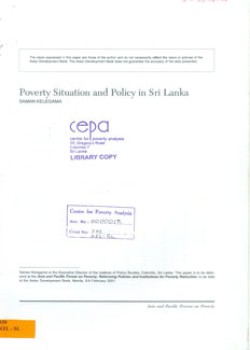
Poverty Situation and Policy in Sri Lanka
Author : Kelegama, Saman
Publisher: Asian Development Bank (ADB)
Place of Publish: Philippines, Manila
Year: 2001
Page Numbers: 23
Acc. No: 12
Class No: 339 KEL-SL
Category: Books & Reports
Subjects: Macroeconomics
Type of Resource: Monograph
Languages: English
In this paper, the writer indicates that a deeper reduction in poverty in Sri Lanka would have been possible with stronger economic performance. One reason for the lack of good economic performance isthe social welfare programmes themselves that create problems for economic management. There is also a shift in emphasis from universal food subsidies to targeted income transfer programs and interventions aimed at assisting the poor to participate in the growth process. The writer is of the opinionthat economic growth has not been sufficiently broad-based and has not automatically trickled down to the poor. Market liberalization has not gone far enough in the labour and land market due to political economy factors. While liberalization is essential for growth, it will underuse the resources of the poor if their specific problems are not addressed directly. The author also points out that in some regions, the combination of private remittances and Samurdhi payments have raised the reservation wage and discouraged the poor from seeking employment. The report argues for exit procedures and incentives for households to graduate from Samurdhi and prevent welfare dependency.



